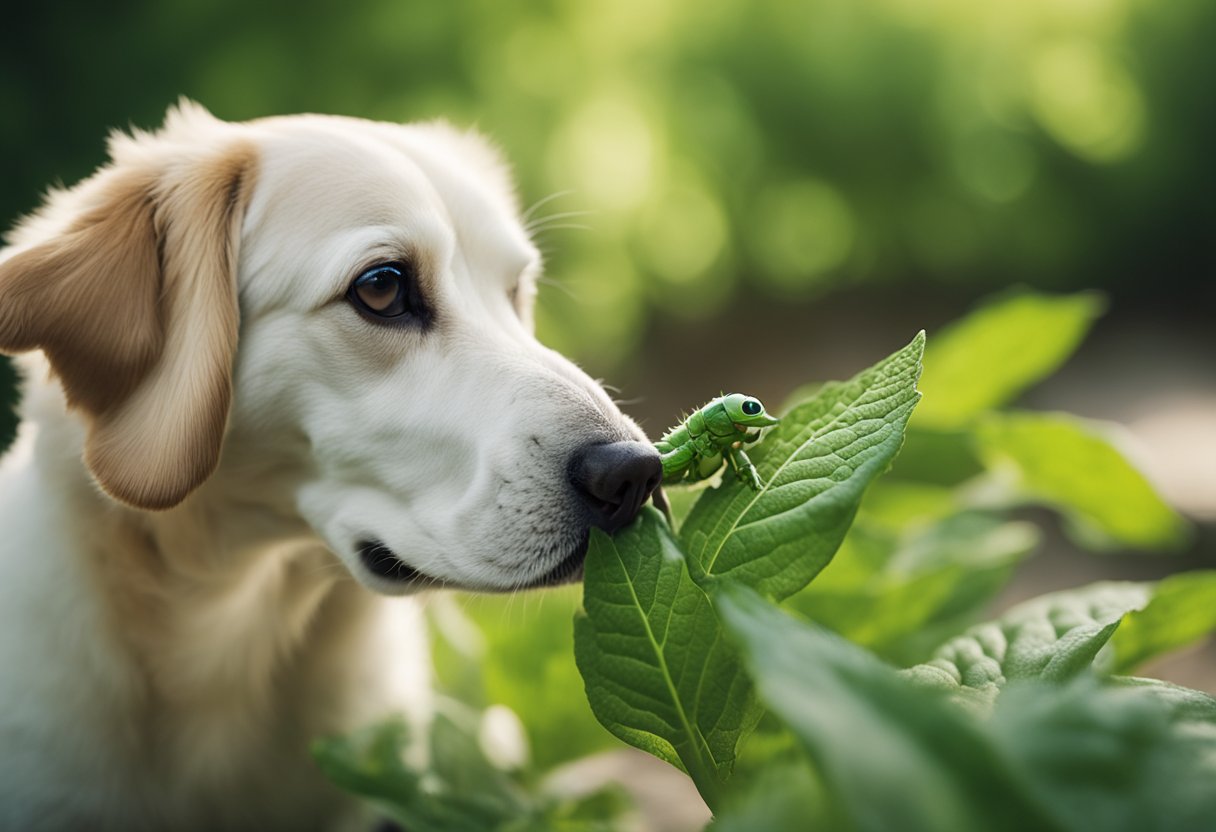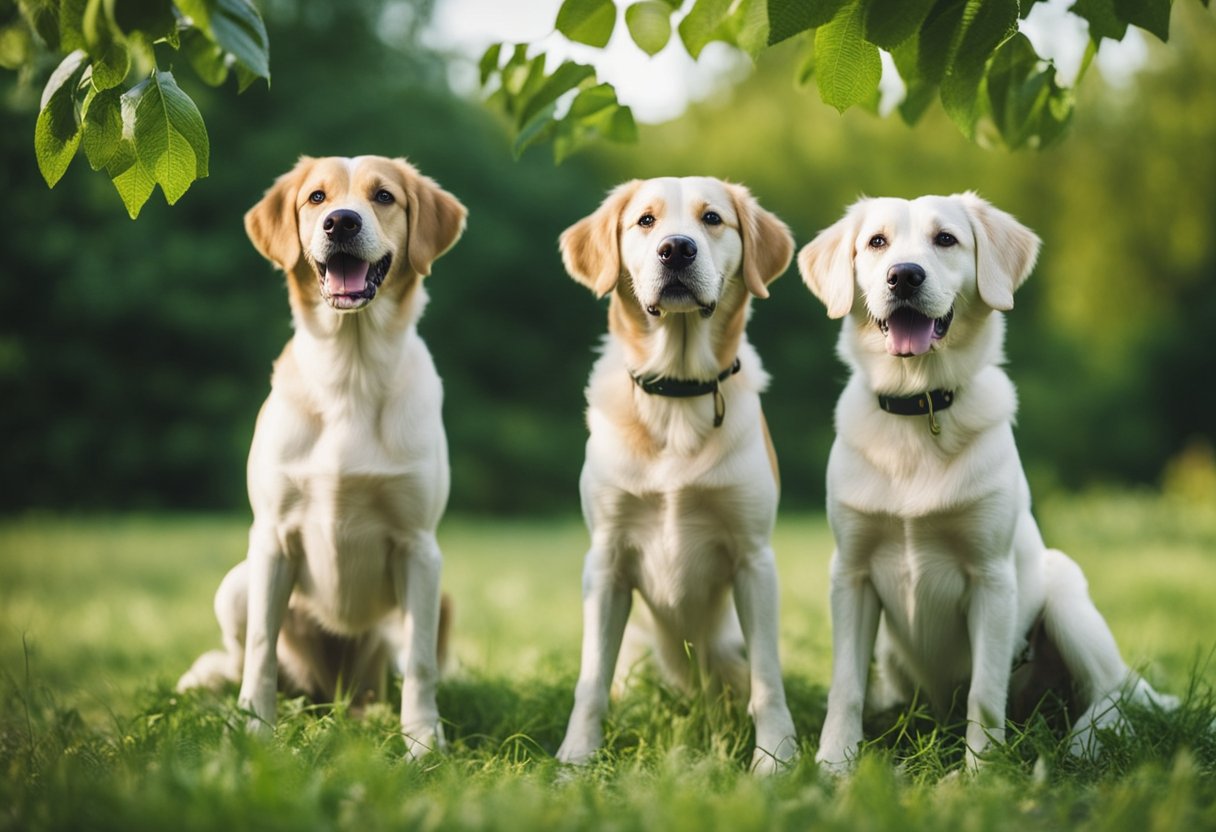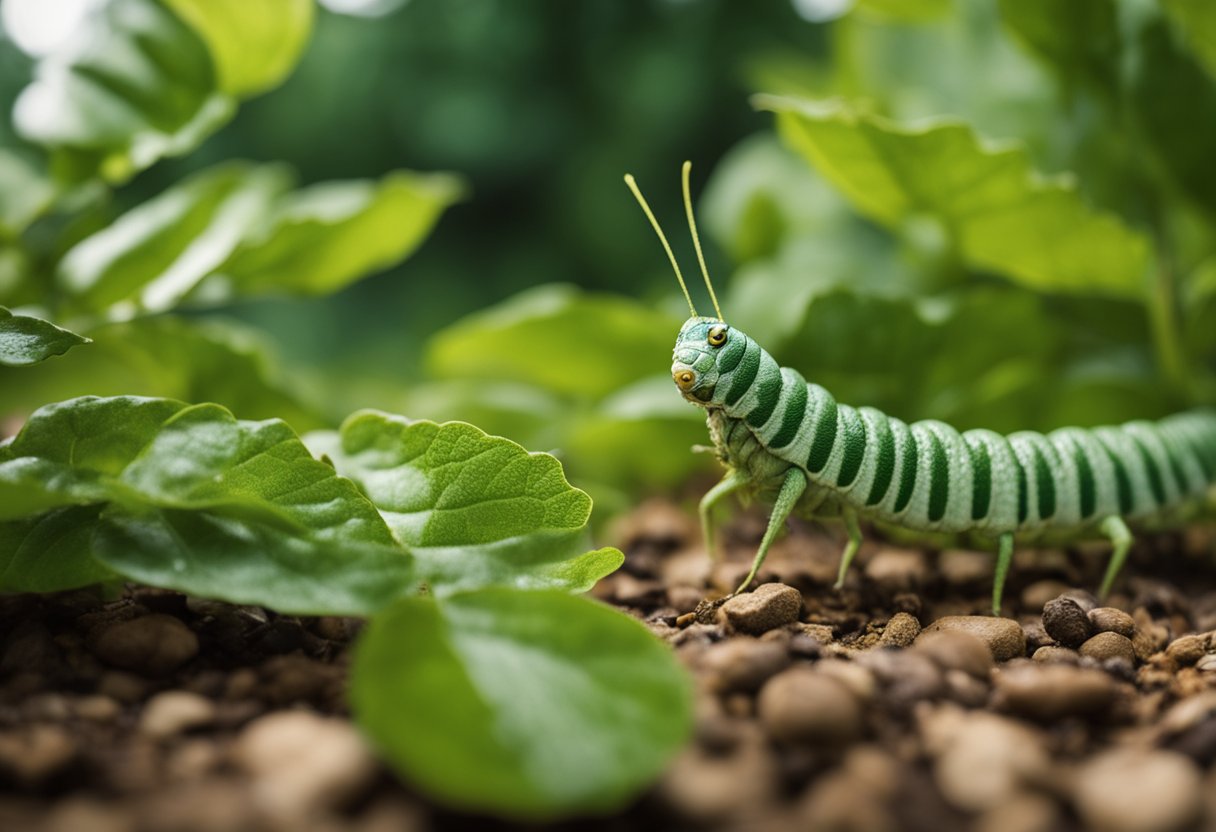As a pet owner, it’s important to be aware of the potential dangers that your furry friend may face. One question that may come to mind is whether or not hornworms are poisonous to dogs. Hornworms are a common caterpillar that can be found in gardens and on plants, and it’s important to know if they pose a risk to your pup.

While hornworms are not typically poisonous to dogs, they can still pose a threat. These caterpillars have spines on their bodies that can cause irritation and discomfort if they come into contact with your dog’s skin or mouth. Ingesting a hornworm can also cause your dog to experience an upset stomach or vomiting. It’s important to keep an eye on your dog if they come into contact with a hornworm and seek veterinary attention if you notice any concerning symptoms.
Are Hornworms Poisonous?
https://www.youtube.com/watch?v=F9G4nNz9Chg&embed=true
As a dog owner, you may be wondering if hornworms are poisonous to your furry friend. The good news is that hornworms are not toxic or harmful to dogs. In fact, hornworms are a common food source for many animals, including birds and reptiles.
While hornworms are not poisonous, they can still pose a danger to your dog if they are not properly prepared. Hornworms can carry harmful bacteria and parasites that can cause illness in your dog. It is important to thoroughly clean and prepare hornworms before feeding them to your dog.
If your dog has accidentally ingested a hornworm, there is no need to panic. Most dogs will not experience any adverse effects from eating a hornworm. However, if your dog begins to show signs of illness, such as vomiting or diarrhea, it is important to seek veterinary care.
In conclusion, while hornworms are not poisonous to dogs, it is important to properly clean and prepare them before feeding them to your furry friend. If your dog shows any signs of illness after ingesting a hornworm, seek veterinary care immediately.
Effects of Ingestion on Dogs

As a dog owner, it’s important to know what your furry friend can and cannot eat. Hornworms are a common garden pest that some dogs may come across. While they may not be poisonous, ingestion of hornworms can have negative effects on your dog’s health.
Immediate Symptoms
If your dog ingests a hornworm, they may experience immediate symptoms such as vomiting, lethargy, and gastrointestinal upset. These symptoms are caused by the hornworm’s spiky exterior, which can irritate the lining of the stomach and intestines.
Long Term Health Risks
If your dog ingests hornworms on a regular basis, it can lead to long term health risks. These risks include diarrhea and gastrointestinal upset, which can lead to dehydration and malnutrition if left untreated. Additionally, if your dog has a weakened immune system, ingesting hornworms can lead to parasitic infections.
It’s important to note that not all dogs will experience negative effects from ingesting hornworms. However, it’s best to err on the side of caution and prevent your dog from eating them. If you suspect that your dog has ingested a hornworm, monitor them closely for any symptoms and contact your veterinarian if you notice any concerning changes in their behavior or health.
In conclusion, while hornworms may not be poisonous to dogs, ingestion can lead to immediate symptoms and long term health risks. It’s best to prevent your dog from eating them and monitor closely for any concerning symptoms.
Hornworms and Other Animals

As a dog owner, you may be wondering if hornworms are poisonous to your furry friend. While hornworms are not toxic to dogs, it’s important to be aware of how they can affect other animals.
Birds and Reptiles
Hornworms are a popular food source for birds and reptiles. In fact, many pet owners feed hornworms to their pet birds and reptiles as a nutritious treat. However, it’s important to note that some birds and reptiles may have trouble digesting hornworms, especially if they are not used to eating them. If you plan on feeding hornworms to your pet bird or reptile, it’s best to start with a small amount and monitor their reaction.
Other Pets
While hornworms are not toxic to dogs, they can still pose a risk to other pets. For example, cats may be tempted to play with or eat hornworms, which can lead to digestive issues or even choking. Similarly, chickens and ducks may also try to eat hornworms, which can cause blockages in their digestive system. If you have other pets in addition to your dog, it’s important to keep an eye on them if you notice hornworms in your yard or garden.
As a responsible pet owner, it’s important to be aware of how different animals can react to hornworms. While they may not be toxic to dogs, they can still pose a risk to other pets if ingested. If you have any concerns about your pet’s health, it’s always best to consult with a veterinarian.
Preventing Hornworm Exposure in Dogs
As a responsible pet owner, it is important to take steps to prevent your dog from being exposed to hornworms. Here are some tips to help keep your furry friend safe:
Garden and Yard Safety
If you have a garden or yard, it is important to keep an eye out for hornworms. These pests are often found on tomato plants, so if you have a vegetable garden, be sure to check your plants regularly. If you do find hornworms, remove them by hand or use an insecticide that is safe for pets.
Another way to prevent hornworm exposure is to avoid planting host plants in your yard. Hornworms are known to feed on tomato, tobacco, and pepper plants, so if you have these plants in your yard, you may want to consider removing them.
Leash and Supervision
If you take your dog for walks in areas where hornworms may be present, it is important to keep your dog on a leash and supervise them closely. This will help prevent your dog from coming into contact with hornworms or other pests that could be harmful.
If you do notice that your dog has come into contact with a hornworm, it is important to monitor them closely for any signs of illness or discomfort. Contact your veterinarian right away if you notice any symptoms, such as vomiting, diarrhea, or lethargy.
By taking these simple steps, you can help prevent hornworm exposure in your dog and keep them healthy and happy.
Hornworms in the United States
As a dog owner, it is important to be aware of the potential dangers that certain insects and pests can pose to your furry friend. One such pest that may be found in the United States is the hornworm. While hornworms are not typically considered to be poisonous to dogs, they can still cause some problems if ingested.
Tobacco Hornworms
Tobacco hornworms are a type of caterpillar that can be found in various parts of the United States, including the southeastern and midwestern regions. These caterpillars are known for their distinctive horns, which are located on their tails.
While tobacco hornworms are not poisonous to dogs, they can still cause some issues if ingested. The spines on their bodies can cause irritation and inflammation in a dog’s mouth, throat, and digestive tract. Additionally, if a dog eats a large number of tobacco hornworms, they may experience digestive upset or even blockages.
Tomato Hornworms
Tomato hornworms are another type of caterpillar that can be found in the United States, particularly in the southern and eastern regions. Like tobacco hornworms, they are known for their distinctive horns.
Tomato hornworms are also not considered to be poisonous to dogs. However, they can still cause some issues if ingested. The spines on their bodies can cause irritation and inflammation in a dog’s mouth, throat, and digestive tract. Additionally, if a dog eats a large number of tomato hornworms, they may experience digestive upset or even blockages.
In conclusion, while hornworms are not typically considered to be poisonous to dogs, they can still cause some issues if ingested. If you suspect that your dog has eaten a hornworm, it is always a good idea to monitor them closely for any signs of digestive upset or discomfort. If you notice any concerning symptoms, be sure to contact your veterinarian right away.
Veterinary Care for Hornworm Ingestion
As a veterinarian, I often get asked whether hornworms are poisonous to dogs. The answer is that while hornworms are not toxic to dogs, they can cause some gastrointestinal issues if ingested. If your dog has eaten hornworms, it is important to monitor them for any signs of illness or discomfort.
If you suspect that your dog has ingested hornworms, the first thing you should do is contact your veterinarian. They will be able to advise you on the best course of action based on your dog’s age, size, and overall health. In some cases, they may recommend inducing vomiting to remove any remaining hornworms from your dog’s stomach.
If your dog is showing signs of discomfort, such as vomiting or diarrhea, your veterinarian may recommend some supportive care to help ease their symptoms. This may include giving your dog a bland diet or administering medication to help control their nausea.
It is important to note that while hornworms are not toxic to dogs, other types of insects and spiders can be. If you suspect that your dog has ingested a toxic insect or spider, it is important to seek veterinary care right away.
In summary, while hornworms are not poisonous to dogs, they can cause gastrointestinal issues if ingested. If your dog has eaten hornworms, contact your veterinarian for advice on the best course of action. They may recommend inducing vomiting or providing supportive care to help ease any discomfort your dog may be experiencing.
Conclusion
In conclusion, it is important for dog owners to be aware of the potential risks associated with hornworms. While these pests are not typically poisonous to dogs, they can cause discomfort and health issues if left untreated.
Prevention is key when it comes to hornworms. Keeping your dog’s living space clean and free of debris can help reduce the likelihood of infestation. It is also important to regularly inspect your dog for any signs of infestation, such as excessive scratching or visible worms in their feces.
If you suspect that your dog has been infested with hornworms, it is important to seek veterinary care as soon as possible. Your veterinarian can provide you with guidance on the best course of treatment for your dog’s specific situation.
Overall, while hornworms may not be poisonous to dogs, they can still pose a threat to your pet’s health and well-being. By taking the necessary precautions and seeking prompt veterinary care when needed, you can help keep your dog safe and healthy.






